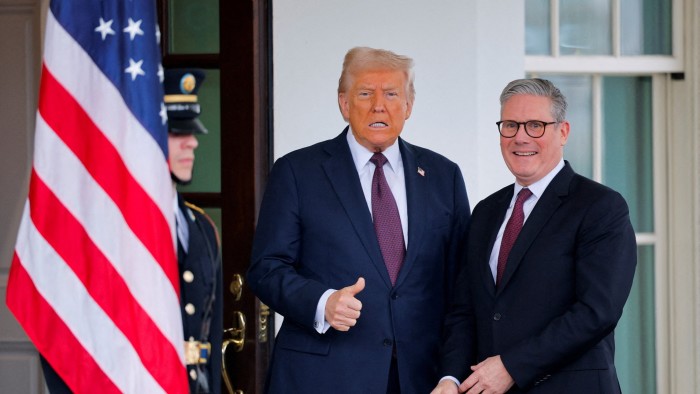This article is an on-site version of our Inside Politics newsletter. Subscribers can sign up here to get the newsletter delivered every weekday. If you’re not a subscriber, you can still receive the newsletter free for 30 days
Good morning. I instinctively roll my eyes at people’s objections to state visits by foreign leaders, no matter who they are. Unless you are actively or indirectly at war with them, might as well dangle some baubles and try to influence them diplomatically.
So I used to think that Donald Trump’s planned second state visit to the UK was, frankly, a no-brainer. But now I’ve changed my mind. Some more on why below.
What do you think? Let me know at the usual address.
Inside Politics is edited by Georgina Quach. Follow Stephen on Bluesky and X, and Georgina on Bluesky. Read the previous edition of the newsletter here. Please send gossip, thoughts and feedback to insidepolitics@ft.com
Signal cracks
Columnist Janan Ganesh has made two unanswerable arguments against my “just have the state visit, Donald Trump loves a bauble” position. First, while these showy occasions may have secured the odd flurry of good headlines for Trump’s counterparts, they have not secured a better outcome on tariffs or security either for those countries directly or for Ukraine. And here’s the other one:
The proven futility of Trump-whispering is a good reason to stop attempting it. But, in Europe, there is another one. It muddies the message that Trump’s America is forsaking its allies.
Imagine being a voter in the continent right now. You are being asked to prepare for higher taxes or less state welfare, and probably both, to fund a generational rearmament as the US withdraws its shield. At the same time, your leaders keep trying to hook Trump with a state visit or with personal charm. This is a dog’s breakfast of a signal. Either we are living through a lasting rupture of the Atlantic bond, in which case Europe must start protecting itself, whatever the sacrifice, or this is a tiff so transient that it might be overcome with inducements and sweet talk.
As it stands, the UK government’s plan is to tell voters that the agreement it has secured with Trump is so good, its diplomacy so effective, that Rachel Reeves has to increase taxes and/or cut spending. That is, to put it mildly, crackers! (For a more elegant version of that, here’s Janan’s column in full.)
There’s a third reason, too, I think. Abandoning the pretence would, I think, force the government to think about seizing some of the opportunities from the mess. One would lie in helping our British universities and easing visa rules to attract more US scientists and academics. Another is to try and attract more wealthy Americans.
There were good political reasons for Labour’s policy to scrap the non-dom regime in opposition: it allowed them to punch a particular political bruise of Rishi Sunak’s, it gave them a line to take on public spending, and it was popular with most voters.
But it comes at a cost: whatever you do with your tax system is a fine balance between attracting people with a lot of things to tax, and taxing them so much they go elsewhere. (Very good piece by Philip Coggan on that topic if you haven’t read it already.)
The policy, already risky, became more so when Jeremy Hunt decided to try and spike Labour’s guns by getting ahead of them and implementing the policy himself. Again, there were good political reasons: put Labour in a bind, etc etc. But the policy has consequences and it is far from clear that the UK taxpayer is better off after the change.
Given that it isn’t just academics and researchers who are feeling jittery about the direction of the US under Trump, it’s something that deserves at least revisiting. And in general, acknowledging that something has gone badly awry on the other side of the Atlantic is worth it if it spurs fresh thinking in the government about the UK’s own policy agenda and place in the world.
Now try this
I saw Rhinoceros at the Almeida Theatre, and while I was impressed by the production, I think Sarah Hemming’s review is exactly right: “The style dilutes the horror”. Frankly the audience shouldn’t laugh this much at Rhinoceros! But I continue my unbroken streak of never being disappointed by a show at the Almeida, which I think continues to be London’s most consistently enjoyable and thought-provoking theatre.
Top stories today
-
Never gonna give food up | Rachel Reeves has opened the door to a cut in tariffs on US cars exported to the UK as part of a trade deal with Donald Trump, but she insisted Britain would not dilute its food standards or vehicle safety rules.
-
Sombre words | Bank of England governor Andrew Bailey said the BoE needed to “take seriously” the risks to growth from Donald Trump’s tariff policies, signalling that the central bank was likely to cut interest rates at its next meeting in response to uncertainty over global trade.
-
Staying together for the kids | More than 60 MPs have signed a letter calling on Keir Starmer to approve a time-limited, capped youth visa scheme to allow British and European 18- to 30-year-olds to travel freely, a move seen as key to unlocking a more ambitious trade reset with the EU, the Guardian reports.
Source link









